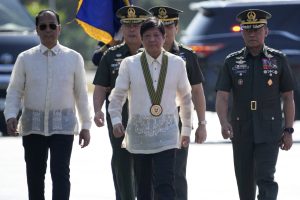The May 2022 Philippine presidential election was unique compared to previous polls because foreign policy became one of the most debated issues in the electoral discourse. This started with President Rodrigo Duterte, who had pushed for a friendly and appeasing policy toward China. His successor would need to decide on how to handle Chinese maritime actions that put pressure on the smaller littoral Southeast Asian states.
Consequently, most presidential candidates took a more uncompromising position considering the Philippines’ territorial and often tense territorial dispute with China. They declared that if elected, they would enforce the 2016 arbitral tribunal award to the Philippines, strengthen the country’s ties with the United States, and build up its conventional defense capabilities.
For example, the opposition candidate and then vice president, Maria Leonor “Leni” Robredo, called for robust and closer security relations with the Philippines’ traditional Western security partners. She also called for promoting the 2016 arbitral ruling on the South China Sea dispute. Other candidates called for a more rigid stance on China while proposing joint development projects in the disputed waters of the South China Sea. They also called for the modernization of the Philippine military and for fostering closer security relations with the United States.
Among the candidates, only one advocated a centrist position in the territorial dispute: Ferdinand “Bongbong” Marcos, Jr., a former senator and the only son of the late President Ferdinand Marcos Sr. His middle-of-the-road position became apparent during the February 18, 2022, presidential debate when he said the Philippines’ relationship with the United States is “not something we can be cavalier about” and that he would not cede any square inch of the Philippines to any country, particularly China. He clarified that he would keep the Philippines’ alliance with the U.S. intact and recalibrate its economic relations with China.
Marcos’ historic win in the election gave him an overwhelming mandate to pursue his middle-of-the-road approach in the maritime dispute. However, internal and external factors complicate his plans.
The Philippine government’s concern over growing Chinese coercive actions against units of the Armed Forces of the Philippines (AFP) and Filipino fishermen in the West Philippine Sea/South China Sea, along with the public’s expectations of a more robust government response, make such a balancing policy challenging to implement. Ultimately, Manila’s pursuit of its foreign policy objectives will depend on whether or not the United States and China determine that it is in their interests to go along with Marcos’ gambit.

































